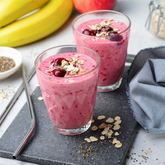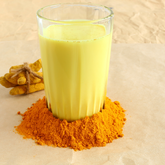As plant-based diets become increasingly popular and the demand for sustainable options rises, the market for store-bought plant-based milk is booming. While these alternatives offer a convenient dairy-free option, it's essential to dive beyond the attractive packaging and read the labels carefully. Your choices not only impact your health but also contribute to your overall well-being. In this blog, we'll shed light on some common additives found in plant-based milk products that might not be as beneficial as they seem.
- Added Sugars: One of the most important things to look for on the label is the sugar content. Many plant-based milk products, particularly flavored varieties, can contain added sugars. While some sugar content is natural due to the natural sugars present in the plant, added sugars can contribute to excess calorie intake and potential health issues like diabetes and obesity. Opt for unsweetened versions or those with minimal added sugars to keep your drink as wholesome as possible.
- Carrageenan: Carrageenan is a common additive derived from seaweed that's used to thicken and stabilize plant-based milk products. While it's generally recognized as safe by regulatory authorities, some studies suggest that it might cause digestive issues in some individuals. If you're prone to digestive problems, it might be a good idea to choose products that don't contain carrageenan.
- Artificial Flavors and Colors: Some plant-based milk products use artificial flavors and colors to enhance taste and appearance. These additives might not align with your goal of consuming a natural and healthy product. Look for options that use natural flavors and colors derived from real ingredients.
- Seed Oils: While plant-based milk products often contain fats for creaminess, not all fats are created equal. Some products use vegetable oils like sunflower or canola oil, which can be high in omega-6 fatty acids. An imbalance of omega-6 to omega-3 fatty acids in the diet can lead to inflammation and other health issues. Opt for products that use healthier fats like coconut oil or almond oil.
- Gums and Stabilizers: Xanthan gum, guar gum, and other stabilizers are commonly used to improve the texture and consistency of plant-based milk products. While these ingredients are generally safe to consume, some individuals might experience digestive discomfort or allergies. If you're sensitive to these additives, consider choosing products with minimal or no gums and stabilizers.
- Fortification Overload: Many plant-based milks are fortified with vitamins and minerals to mimic the nutritional profile of dairy milk. While fortification can be beneficial, excessive amounts of certain vitamins and minerals can lead to imbalances and potential health risks. Check the label for the percentage of daily value for these nutrients and consider how they fit into your overall diet.
- Sweeteners: In addition to added sugars, some plant-based milk products contain artificial sweeteners like sucralose or aspartame. These sweeteners might be used to create low-calorie or sugar-free options, but their long-term effects on health are still being studied. If you're looking for a more natural choice, opt for products sweetened with alternatives like stevia or agave.

In conclusion, the surge in plant-based diets has led to a booming market for store-bought plant-based milk. While convenient, it's vital to scrutinize labels. Watch for added sugars, choose carrageenan-free options if sensitive, and avoid artificial flavors, colors, and unhealthy fats.
To maintain complete control over the ingredients in your plant-based milk, making it fresh at home is the best approach. With Milky Plant, you can effortlessly create any plant-based milk you adore with a simple press of a button. It's a healthy and delicious option, conveniently available right in your own kitchen.




















